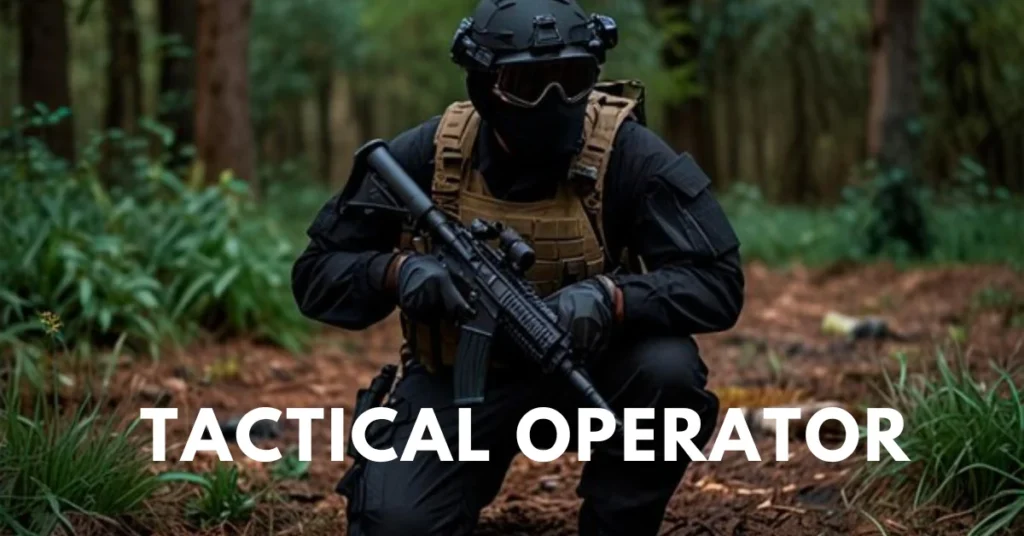Introduction to Tactical Operators
When you hear the term “tactical operator,” what comes to mind? Images of elite forces executing high-stakes missions or maybe a Hollywood blockbuster filled with action and adrenaline? The reality is often more complex than the movies portray. Tactical operators are highly trained professionals who navigate intense situations, requiring not just physical prowess but also mental acuity and unwavering dedication.
This blog post takes you behind the scenes of this fascinating world. We’ll explore what it truly means to be a tactical operator, from their rigorous training regimes to the unique mindset they cultivate. You’ll discover common misconceptions that surround these individuals and learn about the real challenges they face in their line of work. Whether you’re simply curious or considering a career in this field, understanding tactical operators is an insightful journey worth taking. Let’s dive in!
The Training and Qualifications of a Tactical Operator
Becoming a tactical operator requires rigorous training and specific qualifications. Most start with a background in law enforcement or the military. This foundation lays the groundwork for advanced tactical skills.
Training typically includes firearms proficiency, close-quarters combat, and crisis negotiation tactics. Operators must excel in physical fitness as well, often undergoing demanding conditioning programs to build endurance and strength.
Beyond combat skills, operators learn critical thinking under pressure. They train to make quick decisions that can mean life or death during high-stakes situations.
Certifications also play an essential role. Many operators pursue specialized courses in areas like hostage rescue or counter-terrorism. These credentials enhance their expertise and readiness for diverse missions.
Continuous education is vital too. Tactical landscapes evolve rapidly; staying updated on new technologies and strategies is crucial for success in the field.
The Mindset of a Tactical Operator
The mindset of a tactical operator is unique and multifaceted. It combines discipline, adaptability, and relentless focus. Every decision must be calculated under pressure.
Training cultivates resilience. Operators learn to push through physical exhaustion while maintaining mental clarity. They thrive in high-stakes environments, where split-second choices can mean the difference between success and failure.
Situational awareness is paramount. A tactical operator constantly scans their surroundings, anticipating potential threats or changes in dynamics. This vigilance allows them to adapt strategies on-the-fly.
Moreover, teamwork plays a vital role in this mindset. Trusting teammates enhances operational effectiveness and fosters camaraderie that extends beyond missions.
Emotional intelligence also comes into play. Understanding human behavior aids in negotiation or conflict de-escalation during critical moments.
The mindset of a tactical operator is about balance—between aggression and restraint, confidence and humility—and it’s essential for navigating complex challenges effectively.
Common Misconceptions about Tactical Operators
Many people view tactical operators as invincible superheroes, but this image is far from reality. While they are highly skilled professionals, they face the same fears and vulnerabilities as anyone else.
Another misconception is that all tactical operators work in law enforcement or military settings. In truth, their expertise can be found in various sectors such as private security, corporate risk management, and emergency response teams.
Some believe that tactical operators rely solely on brute strength. However, mental acuity plays a pivotal role too. They must think quickly under pressure and adapt to evolving situations.
There’s an assumption that once someone becomes a tactical operator, their training stops. Continuous education and skill refinement are essential to keeping pace with changing technologies and tactics in the field.
Challenges Faced by Tactical Operators
Tactical operators face a myriad of challenges that test their skills and resilience. One significant hurdle is the physical demands of the job. These professionals must maintain peak fitness levels to handle intense situations with precision.
Mental strain is another factor. The pressure during high-stakes missions can lead to stress and anxiety, which requires strong coping mechanisms. Operators often work long hours, sometimes in isolation, increasing emotional tolls on their well-being.
Tech advancements pose both an opportunity and a challenge. Keeping up with evolving technology ensures effectiveness but also demands continuous learning and adaptation.
Public perception plays a role in their daily lives. Misunderstandings about what tactical operators do can create stigma or unrealistic expectations from society. Navigating these perceptions while remaining focused on their duties adds another layer to their already complex roles.
Advancement Opportunities for Tactical Operators
Tactical operators often find themselves on a path of continuous growth. Their skills, honed through rigorous training and real-world experience, open doors to numerous advancement opportunities.
Many tactical operators transition into leadership roles within their units. This shift allows them to mentor new recruits while enhancing team dynamics and strategies.
Some choose to specialize in areas such as counter-terrorism, hostage rescue, or cyber operations. These niches not only deepen their expertise but also increase their value within the organization.
Others may pursue careers in law enforcement agencies or private security firms after leaving tactical teams. The demand for skilled professionals remains high across various sectors.
Additionally, advanced education can pave the way for roles in intelligence analysis or strategic planning. Tactical knowledge combined with academic credentials creates a unique skill set that is highly sought after by employers.
Conclusion
Tactical operators play a vital role in various sectors, from law enforcement to military and private security. Understanding the journey of these skilled professionals provides insight into their world.
The training they undergo is rigorous and comprehensive. It prepares them for high-stakes situations where quick decision-making is crucial. Their qualifications often include specialized courses that enhance their tactical skills, physical fitness, and situational awareness.
A key aspect lies in their mindset. Tactical operators must possess resilience, adaptability, and focus under pressure. This mental fortitude sets them apart from others who may aspire to be part of this elite group.
There are many misconceptions about what it means to be a tactical operator. Some people view them merely as individuals with weapons or combat skills. However, the reality includes teamwork, strategic planning, and community service.
Challenges abound in this profession too—long hours, emotional strain from critical incidents, and continuous need for personal improvement all contribute to the tough landscape they navigate daily.
Despite these hurdles, advancement opportunities exist within this field. Operators can move up into leadership roles or specialize further in areas such as counter-terrorism or crisis negotiation.
Understanding tactical operators reveals both the complexities of their work and the dedication required to excel in it.
FAQs
What is a “Tactical Operator”?
A tactical operator is a highly trained professional skilled in handling high-stakes situations. They use a combination of physical prowess, mental acuity, and specialized training to manage complex scenarios. This role requires not just tactical skills but also the ability to make quick decisions and adapt strategies under pressure.
What kind of training do tactical operators undergo?
Tactical operators undergo rigorous training that includes firearms proficiency, close-quarters combat, and crisis negotiation. They also focus on physical fitness, endurance, and mental resilience. Continuous education and specialized certifications are crucial for staying updated with evolving tactics and technologies.
What mindset is essential for a tactical operator?
A tactical operator must possess a unique mindset characterized by discipline, adaptability, and focus. They need to be resilient under pressure, maintain situational awareness, and work effectively as part of a team. Emotional intelligence also plays a key role in negotiating and managing high-stress situations.
Are tactical operators only found in law enforcement or military?
No, tactical operators can be found in various sectors beyond law enforcement and military. They also work in private security, corporate risk management, and emergency response teams. Their skills are versatile and applicable to numerous high-risk environments.
What are some common misconceptions about tactical operators?
Common misconceptions include the belief that tactical operators are invincible or rely solely on brute strength. Some think their training stops after initial certification or that they only work in military or police settings. In reality, tactical operators face significant mental and physical challenges and continuously update their skills to keep up with new developments.







